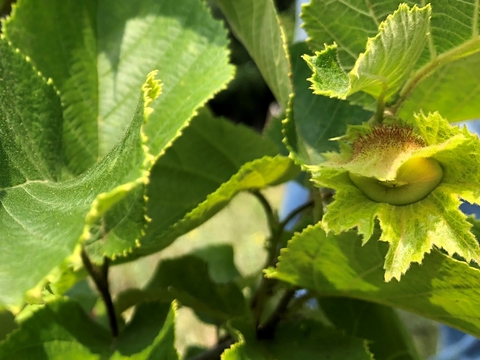Everyone can share in the anticipation of a tasty local nut crop
The hybrid hazelnut as a food crop is a long time coming in Midwestern states, but one thing that isn’t missing is the demand.
“Every Sunday at church, my neighbor asks me, ‘How’s that nut farm coming along?’” says Ken Johnson.
The retired civil engineer from Aitkin introduced hazelnuts in 2022 on a parcel of land where he, his wife and son, Charlotte and Mark, chop wood.
University of Minnesota Extension’s Regional Sustainable Development Partnerships (RSDP) brought growers and curious others to the Johnson plot when they planted, and again in July 2023.
“There are so many things I want to try, but I want to see how someone else got started first,” says Loni Lehnhardt, who owns 160 acres near Mora with her husband and attended the event.
Participants also toured Island Lake Farm in Deerwood, where Jim and Audra Chamberlin produce hazelnuts, vegetables, shiitake mushrooms, livestock and more. The environmental benefits of the perennial shrubs with deep roots fit well into the agroforestry practices they implement on their farm. Once established, hybrid hazelnut shrubs could last there for decades.
Breeding and balancing
Lois Braun is a University of Minnesota hazelnut breeder with the Forever Green Initiative and the Upper Midwest Hazelnut Development Initiative. She studies the performance of their selections (plants produced through selective breeding) under a variety of conditions on the Johnson plot and at Island Lake Farm. Studies on farms complement trials conducted at University research plots across Minnesota.
Braun started the work in 2002 when she became involved through a grant from Extension RSDP to Phil Rutter of Badgersett Research Corp. Her goal is to balance the cold hardiness, disease resistance and flavor of the tiny American hazelnut, which has been enjoyed in the Midwest by Native people for centuries, with the larger size and harvestability of European varieties. The latter are grown most prolifically in Turkey and Spain, as well as in Oregon.
Hybrid hazelnuts are an emerging crop with approximately 250 growers in Minnesota and in Wisconsin, where growers also have Extension support. The American Hazelnut Company buys hazelnuts from growers, husks them, cracks the shells, then sells them as seasoned snacks and culinary oil.
Are you a hazelnuteer?
Greg Schweser, Extension RSDP director for sustainable agriculture and food systems, says potential hazelnut growers are willing to work with other growers, detail-oriented and open to experimenting.
“It’s fulfilling to be a part of something that has the potential to be a small part of the solution to so many problems and to see our selections — the fruit of over 20 years of work — growing and thriving,” says Braun.
“This endeavor is a wonderful thing for our family,” says Johnson. “At times, we feel that we are alone in the wilderness. So it is reassuring to see and talk to folks who see potential in what we all are doing.”
To learn more, visit the Upper Midwest Hazelnut Development Initiative.
Permission is granted to news media to republish our news articles with credit to University of Minnesota Extension. Images also may be republished; please check for specific photographer credits or limited use restrictions in the photo title.


